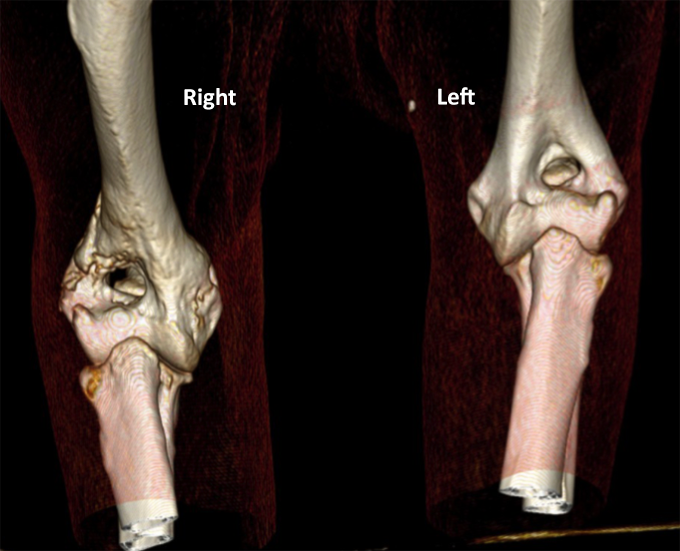Do you have a pet or a patient suffering from CHRONIC PAIN?
Is the pain affecting their QUALITY OF LIFE and you want to improve it?
If the answer is YES, think about referring to our Pain Management Clinic.
What is chronic pain?
Chronic pain is considered when it persists well beyond the normal healing time of the inciting cause (normally more than 3-6 months) or it can be the result of an ongoing noxious stimulus (E.g. osteoarthritis, cancer). Sometimes the pain is more severe than expected based on the inciting cause (as reported by humans) and it can be localised at sites other than those affected by the original condition (E.g. referred pain or contralateral limb or back pain due to positional changes).
Chronic pain is debilitating for the animal, impairing normal activities of our pets (such as playing, running, going up and down the stairs, jumping on/off the sofa!) and reducing their quality of life. There are multiple conditions that lead to chronic pain, including osteoarthritis, cancer, disc disease, syringomyelia, etc. These diseases are normally progressive and debilitating, requiring frequent assessment and appropriate updating and modification of the treatment plan as the disease progresses.
Now that the understanding and treatment options for chronic pain are expanding it is becoming more common to include it as part of our multidisciplinary integrated veterinary approach. Also, an increasingly number of owners are becoming more aware and concerned about their pet’s reduced mobility and behavioural signs of pain and are willing to improve their quality of life.

This picture shows a 3D reconstruction of the CT images from a dog suffering osteoarthritis of the right elbow. The irregular margins of the right distal humerus can be observed and compared to the left, which is normal.
What is the Pain Management Clinic?
The Pain Management Clinic, run by our anaesthesia and analgesia specialist team (Dr. Eva Rioja Garcia and Dr. Anastasia Papastefanou), is a new service offered at Optivet that provides evaluation, quantification and design of a treatment plan tailored to each individual patient. The treatment of chronic pain is not simple and usually requires an integrated approach, including multimodal medical management and other therapies such as acupuncture, mesotherapy, laser therapy and/or steroid injections, where appropriate. For a better outcome, these treatments should be combined with weight management, modification of lifestyle and an exercise/physiotherapy program.
What can an owner expect during a Pain Management consult?
The owner will be asked to fill in a questionnaire designed to quantify the degree of pain their pet is suffering and how this pain is affecting its quality of life. The specialist veterinarian will then conduct a thorough clinical examination of the patient, focussing on the areas reported to be painful but also focussing in other areas to try and identify the trigger points that are causing problems. Sometimes a blood analysis will be performed to ensure that the patient can receive certain medications and to ensure that there is no other organic disease that could be complicating the situation. A treatment plan will then be designed and tailored for each patient, which will include medications and other adjunctive therapies, such as acupuncture or mesotherapy, as appropriate. If the pet is overweight, the specialist vet will also recommend a weight management plan and lifestyle changes that can be further discussed with the referring veterinarian. A re-evaluation plan will also be designed to follow the progression and efficacy of the treatment.
What type of medications are used for chronic pain?
The medications used will vary depending on the condition leading to chronic pain and the health of the patient. For example, in a healthy patient with osteoarthritis, the typical medications used initially are the non-steroidal anti-inflammatory drugs. However, they are not always effective or the patient may not be able to receive them. In those instances, other medications will be used such as paracetamol, gabapentin and/or memantine, to name a few.
What is acupuncture and how can it help in chronic pain?
Acupuncture is the practise of inserting very fine needles into the skin/muscles to produce pain relief. In Chinese medicine, acupuncture is also used to help the body to deal with other diseases. The needles block the messages from the painful area to the brain and encourage the central nervous system to produce more endorphins, the body’s natural painkillers. Acupuncture needles stimulate nerve fibres that do not cause unpleasant feelings of pain, but sometimes animals react to this sensation as if they were expecting pain. Most of the times they accept these fine needles very well and often they become relaxed and even sleepy during the session. That is why normally they do not need sedation during acupuncture unless they are very painful or fearful, or if electroacupuncture is used (a technique that uses small electrical currents). The usual course is once a week for 4 to 6 weeks. Normally after 4 weeks we will know if acupuncture is working for the patient, and depending on the response and the progression of the painful condition we will work out a plan to taper the treatments while maintaining the comfort of the patient.
The response to acupuncture could be one out of three:
- They may seem a little stiffer or more uncomfortable. After a day or two they will improve again and should be better than before.
- You may see no response. This is always disappointing but does not mean the animal will not respond. We will only know if they respond or not after the fourth treatment. About 80% of animals or humans are acupuncture “responders”.
- You may see an improvement within the three days after treatment. Signs of pain may then return before the next treatment is due. After each subsequent treatment, the effects should last for longer, so that the animal may eventually not need more treatments for some time.
If you would like to refer a case to our Pain Management Clinic, please do not hesitate to send us an email to pain@optivet.com or call 01243 888 091



